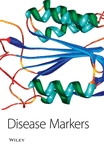GSTM1, GSTM3 and GSTT1 Gene Variants and Risk of Benign Prostate Hyperplasia in North India
Abstract
Glutathione S-transferases (GSTs) play an important role in detoxification of various toxic compounds like carcinogens in cigarette smoke and tobacco by conjugating to toxic compounds and inactivating their hazardous effect. Variation in Glutathione S-Transferases (GSTs) genes may alter the catalytic efficiency of GST isoenzymes leading to potential increase in cancer susceptibility due to various carcinogens. We therefore, investigated association of GSTM1, GSTM3 and GSTT1 variants with susceptibility to benign prostate hyperplasia (BPH) and cigarette, tobacco chewing and alcohol consumption as confounding factors in 141 BPH and 184 healthy controls. Results showed increased risk for BPH susceptibility in patients with GSTM1 null genotype (OR-2.03, p = 0.013) and smoking (OR-3.12, p = 0.028), tobacco chewing (OR-2.54, p = 0.039) and alcohol habits (OR-3.39, p = 0.010). Null genotype of GSTM1 with cigarette, tobacco and alcohol habits predisposed increased risk for BPH.




